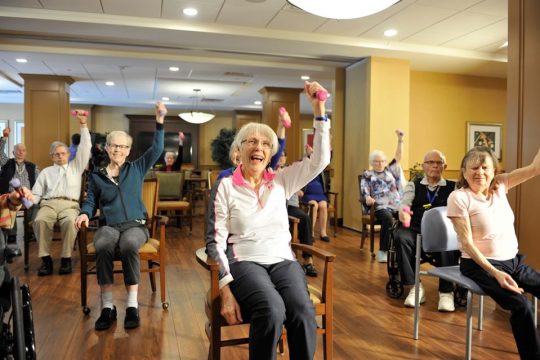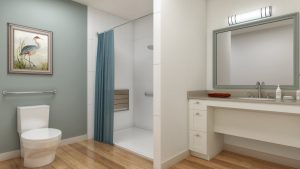
For residents at Cedarcroft Place Retirement Residence in Stratford, preventing falls is all about fun and games.
That’s because they’ve discovered that one of the keys to keeping their balance is to get physical. When asked to describing their Falls Prevention and Group Exercise class taught by a volunteer from One Care, residents say, “You feel good going, during, and after.” And, “The exercises are realistic for us, instructor explains well and helps us when we need”. “It’s a great environment to be in, always a friendly group, and instructor is good!”
With the Public Health Agency of Canada, identifying falls is the leading cause of injury-related hospitalizations among seniors in Canada, All Seniors Care has responded by taking a proactive approach.
Every resident is assessed when they move in, then yearly thereafter, for falls risk. The results form the basis of a series of interventions aimed at keeping people safe. From assessment by an occupational therapist or physiotherapist to medication reviews and environmental modifications, our staff have it covered.
Take The Right Steps
Since falls and accidents seldom ‘just happen’, taking care of overall health and well-being is a big part of the plan. Here are a few expert tips to keeping yourself safe:
Exercise
Regular exercise helps keep you strong and improves balance. It also helps keep your joints, tendons, and ligaments flexible.
According to Dr. Stuart McGill, professor emeritus in Spine Biomechanics at the University of Waterloo in a recently published interview with CBC, “one of the key physical demands for aging people is “to maintain the ability to recover from a stumble… When you’re stumbling, your job is to get your foot out in front of you…Older people fall more easily because they have lost the hip muscle power to get their foot out in front of them, together with the mobility in the hip that allows them to do it easily.”
To keep your strength and mobility, consider:
- Balance training programs;
- Muscle strengthening program;
- Dancing programs;
- Cardiovascular training;
Nutrition
There is evidence that healthy eating behaviours directly influence risk of falling later in life. In 2008/2009 an estimated 34% of Canadian seniors in private households were at nutritional risk.
Speak with your primary care provider about nutrition and how adequate intake of protein can help maintain muscle mass and Vitamin D for bone health.
Since orthostatic hypotension (drop in blood pressure with standing) can cause dizziness and increase fall risk, adequate fluids are recommended to prevent falls. Always stand up slowly after eating, lying down, or resting to prevent your blood pressure from dropping too quickly.
Limit the amount of alcohol you drink. Even a small amount can affect your balance reflexes.
Medications
Find out about the possible side effects of medicines you take. Some medicines might affect your coordination or balance, cause dehydration or urgency, or sometimes confusion.
Footwear, Gait, and Walking Aids
Wear rubber-soled, low-heeled shoes that fully support your feet. Wearing only socks or shoes with smooth soles on stairs or waxed floors can be unsafe.
Use a cane, walking stick, or walker to help you feel steadier when you walk. This is very important when you’re walking in areas you don’t know well or in places where the walkways are uneven. And be very careful when walking on wet or icy surfaces. They can be very slippery!
Use grab bars in your bathroom. Bathrooms are one of the most dangerous areas of the home with more than 70 per cent of falls happen getting in and out of the tub. A safer option used in ASC suites are accessible bathrooms with walk-in showers.
Dress for safety rather than to impress. Clothing that is too long may impede walking or clothing made from slippery fabric can lead sliding off furniture. Also, if you’re having trouble putting on clothing, ask for help to reduce the chance of losing balance while dressing.
LET US HELP
It is important to remember that falls have a significant impact on your quality of life, whether they cause injury or not. Just the fear of falling can cause loss of confidence and depression, which can lead to isolation and anxiety as older adults withdraw from outside activities or social engagements.
Our focus is on implementing multiple preventive measures early and evaluating them often to facilitate your mobility, reduce your chances of losing balance, and help maintain your quality of life for years to come.
To learn more about senior housing options near you, contact us anytime.

